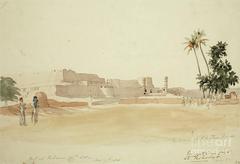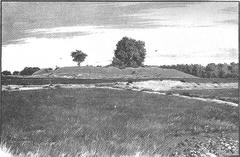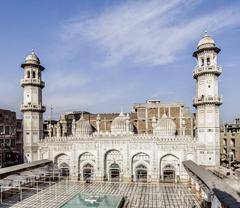Peshawar City Visiting Guide: Hours, Tickets, and Historical Sites
Date: 14/06/2025
Introduction: Explore Peshawar’s Timeless Heritage
Peshawar, one of South Asia’s oldest living cities, stands as a testament to centuries of history, culture, and vibrant tradition. Situated at the gateway to the legendary Khyber Pass, Peshawar has served as a nexus for traders, conquerors, and civilizations for over 2,500 years. Visitors can immerse themselves in a city where Gandharan Buddhist relics, Mughal architecture, and bustling bazaars coexist harmoniously.
This guide offers comprehensive and practical information for travelers, including up-to-date visiting hours, ticketing details, guided tour options, accessibility notes, and essential safety tips. Whether you are an avid historian, a cultural explorer, or a culinary enthusiast, Peshawar invites you to experience its multi-layered past and warm, welcoming hospitality.
For further planning and current updates, consult official resources like Khyber Pakhtunkhwa Tourism, the Peshawar Museum, or the Audiala app.
Table of Contents
- Introduction
- Historical Overview of Peshawar
- Major Historical Sites: Hours, Tickets, and Highlights
- Guided Tours and Accessibility
- Nearby Attractions
- Cultural Highlights
- Practical Visitor Tips
- Frequently Asked Questions (FAQs)
- Conclusion and Resources
Historical Overview of Peshawar
Ancient Foundations and Early Civilizations
Peshawar’s roots trace back to at least the 6th century BCE, when it was known as Puruṣapura, a flourishing Gandharan city and a center of Buddhist learning. Its location along the Silk Road made it a melting pot for cultures and ideas, evidenced by the Buddhist ruins at Gorkhatri and Shahji Ki Dheri.
Medieval and Mughal Eras
Successive empires, including the Mauryans, Ghaznavids, and Mughals, left their mark on Peshawar. Mughal contributions are especially visible in the city’s fortifications and mosques, such as Bala Hissar Fort and the Mahabat Khan Mosque. The Qissa Khwani Bazaar emerged as a hub for merchants and storytellers from across Asia.
Colonial and Modern Transformations
British colonial rule in the 19th and 20th centuries brought new administrative buildings and educational institutions, including Islamia College and Edwardes College. After independence, Peshawar became a gateway to Pakistan’s northwest, blending ancient traditions with modern influences.
Major Historical Sites: Hours, Tickets, and Highlights
Bala Hissar Fort
- Visiting Hours: 9:00 AM – 6:00 PM (daily)
- Ticket Price: PKR 50 (locals), PKR 200 (foreigners)
- Highlights: Panoramic city views, thick ramparts, military museum, and a walk through centuries of military history.
- Accessibility: Steep paths may limit access for visitors with mobility issues.
- Official Info: Khyber Pakhtunkhwa Tourism
Mahabat Khan Mosque
- Visiting Hours: 8:00 AM – 7:00 PM (except prayer times)
- Ticket Price: Free
- Highlights: White marble façade, intricate Mughal-era frescoes, and minarets.
- Visitor Tips: Modest dress required.
- Photography: Allowed except during prayers.
Qissa Khwani Bazaar
- Visiting Hours: Open 24 hours; best visited during daylight
- Ticket Price: Free
- Highlights: Lively market with handicrafts, traditional tea houses, and a rich storytelling tradition.
Peshawar Museum
- Visiting Hours: 10:00 AM – 5:00 PM (closed Mondays)
- Ticket Price: PKR 20 (locals), PKR 100 (foreigners)
- Highlights: World-class Gandharan Buddhist art, ethnographic exhibits, and Islamic artifacts.
- Accessibility: Wheelchair accessible.
- Official Website: Peshawar Museum
Sethi House
- Visiting Hours: 10:00 AM – 6:00 PM (may require appointment)
- Ticket Price: Varies (typically PKR 200–500)
- Highlights: Exquisite 19th-century merchant mansion with stained glass, carved woodwork, and a labyrinthine layout.
Guided Tours and Accessibility
Local operators offer guided tours covering Peshawar’s major sites and bazaars. Guided tours can be booked through hotels, travel agencies, or the Audiala app. Most major attractions are accessible to the general public, but some, like Bala Hissar Fort and Sethi House, have uneven surfaces or stairs that may limit access for some visitors.
Nearby Attractions
- Jamrud Fort: Historic stronghold at the mouth of the Khyber Pass. Open 9:00 AM – 5:00 PM.
- Shahi Bagh: Mughal-era royal garden, ideal for relaxation and people-watching.
- Gorkhatri and Shahji Ki Dheri: Important archaeological sites reflecting Peshawar’s Buddhist and Hindu heritage.
Cultural Highlights
Festivals and Traditions
Experience festivals such as Jashn-e-Peshawar, featuring music, dance, crafts, and traditional attire. Religious festivals like Eid al-Fitr and Eid al-Adha are marked by communal prayers and feasts, especially at Mahabat Khan Mosque.
Cuisine
Peshawar’s culinary scene is famous for Chapli Kebab, Kabuli Pulao, Namak Mandi Karahi, and green tea (kahwa). Namak Mandi food street is a must-visit for food lovers.
Handicrafts and Bazaars
Bazaars offer handcrafted leather goods, Peshawari chappals, embroidered textiles, and carpets. Chitrali Bazaar is especially known for traditional clothing and headgear.
Practical Visitor Tips
- Best Time to Visit: October to March (cooler weather, vibrant festivals)
- Dress Code: Modest clothing is recommended; women should consider a headscarf at religious sites.
- Safety: Security has improved, but check travel advisories. Stick to well-known areas and avoid traveling after dark.
- Getting Around: Rickshaws, taxis, and the BRT system are available. Most historical sites are best accessed on foot or via local transport.
- Language: Pashto and Hindko are widely spoken; Urdu and English are common in tourist areas.
- Photography: Always request permission before photographing people or sensitive sites.
Frequently Asked Questions (FAQs)
Q: What are the visiting hours for Bala Hissar Fort and the Peshawar Museum?
A: Bala Hissar Fort is open 9:00 AM–6:00 PM; Peshawar Museum is open 10:00 AM–5:00 PM (closed Mondays).
Q: How do I purchase tickets for historical sites?
A: Tickets are generally available at the entrance. Some sites offer online booking via official tourism websites.
Q: Are guided tours available?
A: Yes, through local tour operators and online platforms such as Audiala.
Q: Is Peshawar safe for tourists?
A: Security has improved, but stay informed through official advisories and avoid risky areas.
Q: Which languages are commonly spoken?
A: Pashto, Hindko, Urdu, and English (in tourist and business areas).
Conclusion
Peshawar stands as a living museum—its fortresses, mosques, museums, and bazaars narrate stories of empires, migrations, and vibrant local traditions. By following this guide, visitors can experience the city’s historical depth, cultural richness, and renowned Pashtun hospitality while staying safe and respectful.
For updated travel tips, guided tour bookings, and exclusive content, download the Audiala app and consult resources like Khyber Pakhtunkhwa Tourism and the Peshawar Museum.
References and Further Reading
- Khyber Pakhtunkhwa Tourism
- Peshawar Museum
- Audiala
- Elands.pk
- Tourist Places Guide
- HowSafe.net
- Gypsy Tours
- Graana.com
- TravelSetu
- PeshawarLive.com
- Rehlat.ae
- Apricot Tours
- Tribune
- Zameen.com
- Guide to Pakistan




